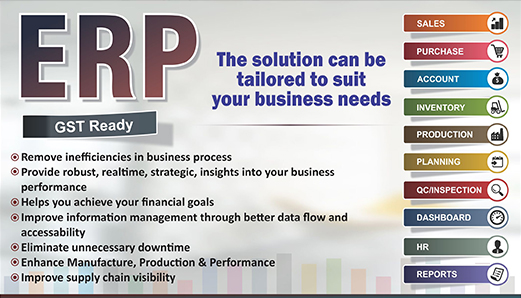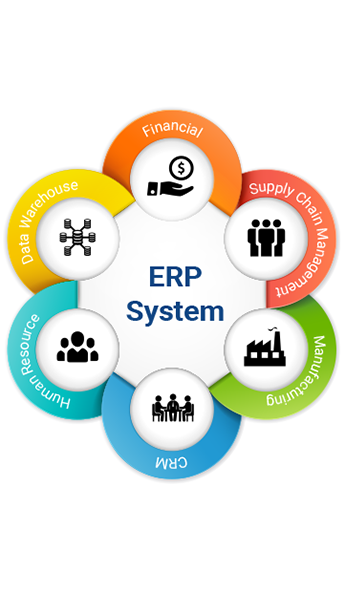An ERP solution eliminates repetitive processes and greatly reduces the need to manually enter information.
- (+91) 997 890 0503
- info@unitechsol.in
ERP SOLUTION
In the last few years, an increasing number of businesses have opted for ERP solutions.
An ERP management information system integrates areas such as planning, purchasing, inventory, sales, production, finance and human resources.
ERP System
Enterprise resource planning (ERP) is business process management software that allows an organization to use a system of integrated applications to manage the business and automate many back office functions related to technology, services and human resources.
ERP software typically integrates all facets of an operation — including product planning, development, manufacturing, sales and marketing — in a single database, application and user interface.

ERP software typically consists of multiple enterprise software modules that are individually purchased, based on what best meets the specific needs and technical capabilities of the organization. Each ERP module is focused on one area of business processes, such as product development or marketing.
Some of the most common ERP modules include those for product planning, material purchasing, inventory control, distribution, accounting, marketing, finance and HR. A business will typically use a combination of different modules to manage back-office activities and tasks including the following:
- Distribution process management
- Supply chain management
- Services knowledge base
- Configure prices
- Improve accuracy of financial data
- Facilitate better project planning
- Automate the employee life-cycle
- Standardize critical business procedures
- Reduce redundant tasks
- Assess business needs
- Accounting and financial applications
- Manage human resources and payroll
Discover All The Features of ERP
Cras pellentesque odio ligula, sed suscipit massa venenatis et. Nam nec mi at metus tincidunt commodo sed
Efficiency
Collaboration
Collaboration between departments is a crucial and often necessary part of the business.
Integrated Information
No more issues with data spread across separate databases; all information will be housed in a single location.

Cost Savings
It allows manufacturers to proactively manage operations, prevents disruptions and delays, breaks up information logjams and helps users make decisions more quickly.
Reporting
ERP software helps make reporting easier and more customizable.
Productivity
By having redundant processes automated, users have more time to work on other pressing projects and tasks.
The feature of erp
Manage anything you want with our erp modules
There are many advantages to implementing an Enterprise Resource Planning (ERP) software solution. Among countless other advantages, implementing ERP software can improve productivity, increase efficiencies, decrease costs and streamline processes.

